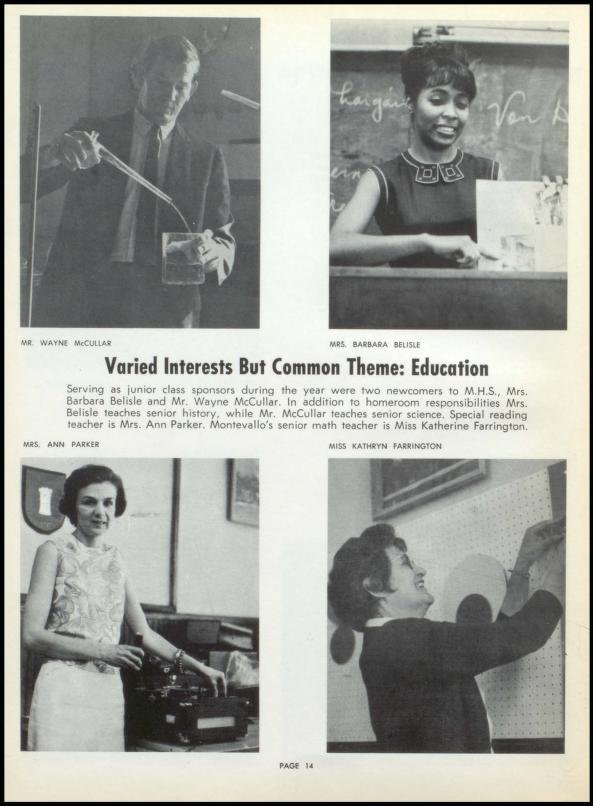Barbara Belisle’s long walk to the schoolhouse door
In Sept 1967, the Montevallo HS newspaper, the Spotlight, announced that Barbara Belisle, a graduate of Prentice HS, had joined the teaching staff as a social studies instructor. There was nothing to suggest the momentous nature of this hire: Belisle had agreed to become the first Black person to teach in an all-white school in Shelby County. Nor did the paper hint at the truth concealed by the principal's description of the beginning of the school year as "the smoothest" he had known.
Belisle had a different story to tell, and she wanted that story to be known. She provided a candid and detailed account of her first days at Montevallo HS in A Long Time Learning: A Story of Change in a Small Town, a memoir she self-published in 2007.
The story begins in spring of 1967 when, as Belisle humorously puts it, "Forced integration had come to the heart of Dixie!" The school board recruited her to be a kind of test case in a county where "they didn't want them to integrate, they didn't want to integrate, nobody wanted to integrate." Everybody expected trouble. She had graduated just two years earlier from Miles College, where, perhaps unbeknownst to the school board, she had taken part in sit-ins and demonstrations in Birmingham. But she was pretty, poised, mild-mannered, and polite, and, as she dryly notes, she impressed a member of the board "with my ability to speak well and converse intelligently." (She can't resist adding: "And this from someone who had made several grammatical errors in the few minutes I had been there.")
Driving to school in the fall for teachers' meetings she was already feeling the stress. She felt nauseous, her hands shook, her head ached. She was struck by the difference between this beautiful brick school, with wide halls and tall white columns, and the wooden school she had attended with its creosote-treated floor and wood-burning stoves.
She enjoyed the opportunity to address her new colleagues. "Give me an audience, and I come alive." She felt proud to be "representing all black people, and I wanted these people to know that we're not dumb, stupid, lazy, and valueless as I knew many whites thought." Gazing out at her audience she could see sincere good-will in the eyes of some and hatred in a few. But the rest of the day went well, except for the discouraging news that two or three faculty members had requested transfers or planned to resign to escape having to work with a Black person.
But nothing prepared her for the first morning of classes. She arrived to find a milling crowd massed outside the school. There were students, grown-ups, some Klansmen, photographers, local and county police, and a couple of state troopers with lights flashing. "White people everywhere!" And she was alone.
The crowd parted just enough to create a narrow aisle leading up to the schoolhouse door. Her walk to the door was harrowing:
As I walked proudly and defiantly toward the door, I could smell a nauseating combination of odors -- bad breath, tobacco, cologne, body odor, and miscellaneous other scents. I remember hearing the rasping sound of emphysema and thinking, 'That person ought to be in bed.' Feeling a little queasy, I thought if they wanted me dead, the aisle needed to be just a little bit longer.
While my knees debated whether to buckle outside or inside, I put on a cheerful smile and said "Good morning" several times. Immediately, I heard several cheerful "Good mornings" in response. I couldn't believe it! "Maybe it won't be too bad," I said to myself. Then, just as I opened the door, I heard, "Don't be saying 'Good morning' to no gawd damn nigger, stupid.' A few people laughed. . . . Why I didn't just turn around and run back to my car and to the safety of my home and family, I don't know."
Barbara Belisle did not turn and run as many of us would. She stuck it out and the world around her changed. She, along with her students and their families, learned over the years to work together to make racial integration work.
Her death in February 2021, aged 84, brought forth a torrent of tributes. People remembered a woman beloved by her students, her colleagues, and her community; a beautiful, elegant, gracious woman; a life-long educator who had earned countless honors and awards. She was Montevallo's incarnation of Maya Angelou's "phenomenal woman." She could say, with the poet, "I don't shout or jump about / Or have to talk real loud. / When you see me passing, / It ought to make you proud."
This phenomenal woman was also a Civil Rights trailblazer, a freedom fighter on education's frontline. When our town needed a teacher of heroic courage to walk that long walk by herself, Barbara Belisle rose to the occasion. Public education in Shelby County would never be the same.
Sources: We relied on Belisle's memoir, A Long Time of Learning, supplemented by an oral history interview dated April 30, 2014. Both are preserved in UM's Milner Archives and Special Collections. Thanks to Carey Heatherly, Archivist, for his assistance.
Submitted by Kathy King & Anitka Stewart Sims
Contact us at Movaltrail@gmail.com. We want to hear your stories and welcome correction of any errors of fact or interpretation.



